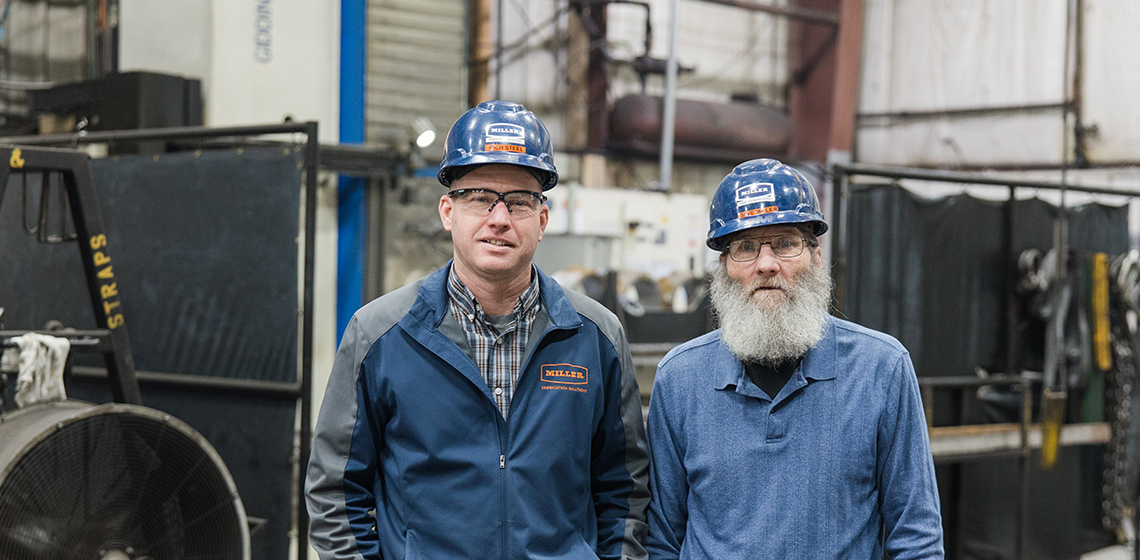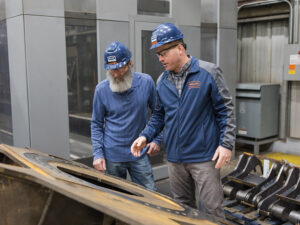
60 Years: The Employee Perspective
October 17, 2023
Our skilled and dedicated people allow Miller Fabrication Solutions to serve OEM customers well. These team members are deeply important to us. Because we recognize that the 60th anniversary we celebrate this year would not have been possible without the people who work at Miller now and those who have worked here over the decades, we wanted to hear some longtime employees’ perspectives on this milestone.
Given the role family has played in our long history, Dick and Rich Steel immediately came to mind. They have a combined half-century of experience with Miller. Dick, who retired in January 2021, was with us for three decades – first as a welder and later as a machinist at our Sandy Lick plant for 28 of those years. His son Rich, who will soon celebrate his 20th anniversary at the company, started as a machinist and now serves as our Director of Lean Manufacturing.
We sat down with Dick and Rich to ask them about working at Miller, the changes they’ve seen over the years and memorable moments on the job. Here’s how the western Pennsylvania natives answered our questions:
Q: Rich, was your dad’s experience at Miller a factor in you joining the company?
In the sense that it showed me Miller was a good place to work, yes. I also learned about manufacturing as a possible career from him. What ultimately sealed the deal for me was how flexible Miller is. My dad always worked a night shift, and so did I when I first started. But unlike a previous manufacturing employer, Miller wasn’t rigid about what time my shifts started. I had young kids when I joined the company in 2004, and Miller’s scheduling flexibility allowed me to balance work with family life. I think that stems from the fact that Miller is a family-owned operation that values people.
Q: What did/do you like most about working at Miller?

Dick: They always treated me well. They made sure I had the skills necessary to do my job, and then they left me to it. And when you did things right, your bosses respected you. I enjoyed my time at Miller and never really thought of it as “work.” In fact, I didn’t miss a single day the whole 30 years I was there.
Rich: Besides the fact that they are always accommodating if you need time off for kids’ events or other family responsibilities, it’s enjoyable to me because we do a lot of interesting work. It’s rewarding to know there’s a good chance we made parts for big equipment you see going down the road or being used on a construction site. And maybe I even machined a part you see out in the world. It’s just neat to think about and be a part of that.
Q: What changes or advancements have you seen over your years at Miller?
Dick: For me, it has to be automation. When I first started at Miller in 1991, we did a lot of things manually. We used our hands a lot more back then, which I loved. Beginning in the mid-1990s, they started using CNC machines that did what they were programmed to do. So, if you program them right, you get a good part. That really helped quality control, because there’s obviously a lot more room for human error when you manually machine parts.
Rich: The biggest change I’ve seen is Miller’s transition from a job shop to a contract manufacturer. When I came on board in 2004, we were still doing the kind of repair work from steel mills that Miller had done since the company started. Today, we hardly do any one-off jobs; it’s all contract manufacturing for the big OEMs. Automating production with CNC machines really paved the way for Miller to become a strategic partner for some of the biggest OEMs in the world. It enabled us to go from batch processing to just-in-time production, reducing lead times, because we have safety stock based off forecasting. And that’s really the difference between a job shop that makes an order and a contract manufacturer that replenishes product as we ship it.
We also have formalized the budgeting process and use sales and operations planning to evaluate our capacities and capabilities. That’s allowed us to diversify our customer base and the solutions we offer, especially over the past five to 10 years.
Q: Why do you think Miller has been successful for 60 years?
Dick: Miller just treats people right. Employees like working here, and customers keep bringing business to us. Miller also is committed to improving the way work gets done. They meet customer challenges by expanding their capabilities. That’s what happened when a big construction industry OEM came to Miller for the first time. The customer’s expectations from a quality standpoint forced us to establish better processes, which benefits other customers, too. Miller also takes smart risks that help the organization grow and improve, like taking on certain kinds of work they don’t have specific experience doing. That also has a positive impact on all customers. When Miller gets better, parts get better, which helps our customers’ businesses. I think they feel like they get good value from Miller for all those reasons.
Rich: I think dad’s right when he talks about the way Miller treats people. That’s a big part of it. They also just have good business sense. The Miller family learned from some early difficulties, like when they had to lay off a lot of people after the steel industry crashed in the early ‘80s. Instead of waiting for the industry to recover, they figured out how to get different work so they could rehire employees. That was the beginning of their transition from a repair job shop to a strategic contract manufacturer. They just continue to evolve and stay ahead of industry changes, so we remain competitive, viable and able to continue offering a good place for employees to work.
Q: What’s your favorite Miller memory?
Dick: What I remember most is thinking how much I enjoyed going to work. It didn’t feel like a job. That really made every day a good memory for me.
Rich: One of the best memories for me is the time we did a one-off job for an airline supplier when I was crew leader in the machine shop. The customer needed these big, stainless-steel frames for airplane wings machined flat and thousands of holes drilled and tapped into them. And while we did have stainless welding, cutting and machining capabilities, we hadn’t done a lot of it. As the crew leader, I was tasked with figuring out how to tap the stainless, which can be kind of gummy, without breaking chips off. So I worked with the tap supplier, the machine operators and the engineering department, and those parts came out beautiful. You could see yourself in the mirror finish on them, and we tapped all those holes successfully without any damage at all. It was a good team success after initially having been a little nervous about taking on that kind of project.
Q: Is there anything else you’d like to say about your time at Miller?
Dick: I just really want to thank Miller for 30 good years of work. They treated me right, and they treat my son right, and I appreciate that.
Rich: I share my dad’s sentiments. I appreciate the opportunities I’ve had here. And, while I feel like I earned them, they wouldn’t have been possible if the Millers hadn’t seen potential in me and acted on it. Because of them, I’ve had so many great opportunities to learn and challenge myself in new ways, and also to travel the world. This work allows me to provide for my family while enjoying a lasting, meaningful career. I expect I’ll be retiring from Miller one day as well, like my dad. It’s just a great company, and I’m proud to be part of it.
You Might Be Interested In
Corporate
March 12, 2025
Pam Elkin: A “Miller Lifer”Corporate
December 16, 2024
Investing in Our People: Miller Reinstates Weld School